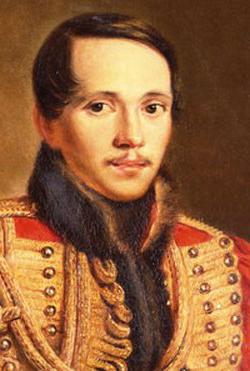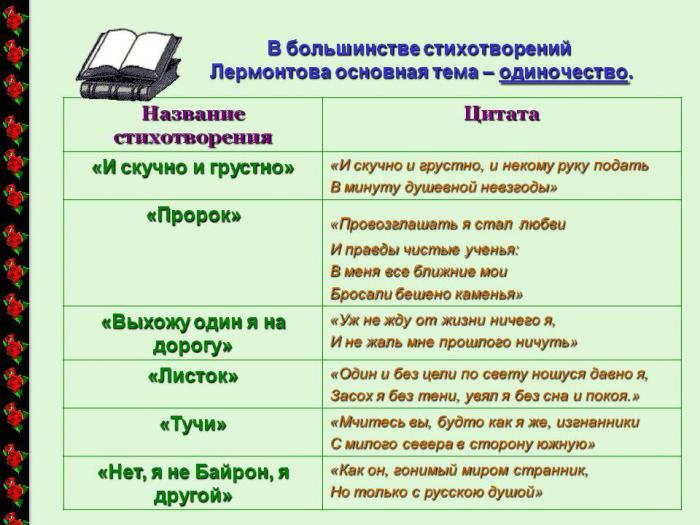Russian literature of the first third of the 19th century, mainly romantic. Readers were fascinated by Byron and Schiller, Goethe and Walter Scott, Zhukovsky and Bestuzhev-Marlinsky. Paying tribute to new trends, the early Pushkin, the young Ryleyev, is doing this in this vein. Young Lermontov harmoniously blended into the literary movement . However, it was he who was especially honored to overcome stamps and stereotypes and create a fundamentally new - Lermontov - romanticism.
Why "not Byron"

The image of the rebellious soul in Lermontov’s romantic lyrics stands out among literary characters with similar themes and the artistic means of revealing them. In his program poem, comparing himself with the founder of English and European romanticism, Byron, the young poet emphasizes that he has a "Russian" soul. And therefore, everything that falls into the field of view of the lyrical hero is painted with the national Russian flavor, transferred to the domestic soil. No, of course, the image of the rebellious soul in Lermontov’s romantic lyrics is closely related to Byron’s, not without reason the poet uses a comparative comparison: “like he, a wanderer persecuted by the world ...”. However, this is all that unites the heroes. Because the angry, often pompous disappointment of the characters of Byron’s lyrics, their striving for exotic countries and fatal passions seem fake, like a game of actors from provincial theaters. The image of the rebellious soul in Lermontov’s romantic lyrics is different.
The abyss between the hero and the "world"
In terms of scale and depth of experience, it is comparable, perhaps, with the boundless abyss of the ocean - incomprehensible, mysterious, "gloomy". Hyperbole is generally characteristic of the poetry of Mikhail Yurievich. Moreover, it is appropriate when it comes to the most important things that are significant for the author. The poet will never be understood by the crowd, will not be open to her, for he is too big. Therefore, the image of the rebellious soul in Lermontov’s romantic lyrics is always tragic. He is a loner, doomed by his talent to a spiritual vacuum. Only the Creator, the Creator is equal to the Poet. Only He or the author himself can convey to others the thoughts, feelings, ideals of the lyrical hero. But in this way, the problem of the spiritual loneliness of a creative person in the world of average people, of “proud mediocrities” is even more acute. Many poetry of M. Lermontov is dedicated to her.
"I am alone ..."
Continuing the theme of loneliness as one of the main lines in the romantic direction, let us consider in a few more examples its projection onto Lermont's lyrics. The life of Mikhail Yuryevich is endless wanderings, and he himself is a wanderer, an “oak leaf” torn from his place by alien external forces. Isn’t his poetry narrating? M. Lermontov writes a lot on the topic of freedom / lack of freedom, by which he understands not only the absence of external fetters, but also the possibility of a creative person to live, as he sees fit. The poet did not have this freedom. Link was replaced by link, some censorship restrictions by others, persecution by persecution. Therefore, the motive of captivity, imprisonment, and prison so often arises in his lyrics. The prisoner languishing behind bars, looking longingly at the distant sky, at the open spaces - the poet himself, Lermontov. Quotes of works by ear, isn't it? "I am alone - there is no joy ...", "Silently sitting under the window of the dungeon ..." and many others.

Features of Lermontov's romanticism
And even in those lyrical miniatures that seemingly are far from social issues, the tragic note of melancholy and hopelessness before the inexorability of Rock, personified by the Russian autocracy, sounds distinctly and clearly. Remember the famous: "Clouds of heaven, / eternal wanderers ...")? What Lermontov writes (quotes): “You rush, / as if I were / exiles ...” And then he lists the reasons that running clouds are tearing from the “dear north”. You must admit that they correspond more to our restless human tribe than to “eternally free” and “eternally cold” indifferent clouds. And it was him, Lermontov, who was constantly disturbed by the open malice of the world, the secret envy of enemies, and the “fate of the decision” in the person of the government. Therefore, the romantic tradition of contrasting the individual and the world acquires a different interpretation in the work of Mikhail Yurievich than in European literature.
Life is a struggle
The themes of Lermontov’s poetry are diverse and diverse. This patriotic lyrics, and love, and socio-political, civil, philosophical, poet and poetry. But first of all, it is the lyrics of protest, struggle, intransigence, rebellious emotional restlessness. The poet’s lyrical hero cannot be pacified, calm, and serene by definition - well, this is not his, not his! What poem do you recall when mentioning the name of Lermontov? "The sail is whitening," right? And not only because we are one of the first to teach him at school. A lonely fragile sail, battered by storms, but bravely and boldly directing its way against the current, eager for struggle and seeing the meaning of life in it - this is Mikhail Yuryevich, as we know him from poems, poems, dramas, from the memoirs of contemporaries. This idea is confirmed by such works of M. Lermontov, such as, for example, “Dagger”, “Sadly I look ...”, “Both boring and sad ...”, “Poet”.
Poet and poetry
The image of the dagger, an invariable attribute of romantic poetry, is also present in the lyrics of Lermontov. And if in the poem of the same name it denotes really cold weapons, personifies the militancy and love of freedom not only of mountain peoples, but also of the lyrical hero (“I love you, my damask damask”), then in the “Poet” Mikhail Yuryevich again resorts to the analogy. He compares poetry, the work of the Poet with a double-edged blade. Once the Poet’s thought, his inspired images captivated the people, raised morale, ignited the battle for high ideals. But that was once. And then poetry, art receded into the background, lost educational positions, refused to go to the spiritual vanguard. Poetry exchanged its formidable, restless, but such an important primacy for calm, indifference, laziness. She became useless, entertaining, like a dagger, a golden toy hanging on the wall. Lermontov’s romantic rebellious spirit cannot come to terms with this state of affairs. He exclaims bitterly: will the “ridiculed prophet” wake up, dare to regain his former power over minds and souls, become a herald of the “truths of the ages” again, or he reveres in spiritual, moral hibernation equivalent to death.
Love and philosophical lyrics
A romantic hero is usually unhappy in love. She is either undivided, or lovers are separated by insurmountable obstacles. Lermontov’s subject is much deeper. The poet is not only incomprehensible to the crowd - he is also disappointed in love. “I am sad because / you have fun ...”, “I will not be humiliated before you ...” - these are the most characteristic examples of personal relationships of the lyrical hero and the recipients of his love lyrics. A lonely pine tree dreaming of a beautiful palm tree, a sad cliff hiding a tear and looking longingly after a fleeing cloud - all this is Lermontov. He is "bored and sad", "no one to give a hand," he alone "goes on the road." Enclosed in himself, constantly reflecting, in a hostile environment of light, the poet does not find a kindred, dear soul. Proud, rebellious Demon, the eternal sufferer and wanderer, who dared to rebel alone against all.
Mtsyri - favorite poet's ideal
And another rebellious, restless soul attracts our attention in the works of Lermontov.
This is Mtsyri, his favorite hero. Proud, independent, unbroken by fate, rebellious and free, who gave himself all to his only dream and passion - to find will and homeland, to find out, “for the will or prison” a person is born into the world. For a free and vibrant life, full of deliberate action - the poet is sure of this and transfers his confidence to us, his readers!